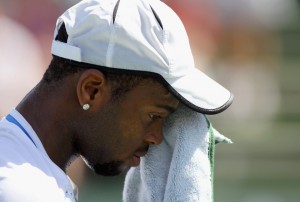Donald, Donald, Donald. Will it ever happen?
If you still think there’s a heroic tennis future in Donald Young’s life, you’ve got a lot more optimism than most.
He’s certainly teased us a few times since absurdly turning professional at age 14, now seven years ago, and he teased us again two days ago by dominating Andy Murray, one of the best players in the game.
But this afternoon at the Indian Wells 1000, where certainly he expected to build on the momentum he gained in the Murray match, he was washed out of the tournament by No. 28-ranked Tommy Robredo by 6-0, 6-4.
In a vacuum, losing to a former top-10 is no great shame. But he wasn’t playing in a vacuum. He was playing with — one assumed, anyway — a mountain of confidence and, though he flashed a few scintillating moments Monday, he was, on balance, just awful.

Three winners and 13 unforced errors in the 22-minute opening set and 13 winners with 32 unforced errors for the match is the broad-brush story.
When you down into the details, though, there was a lot more to be disappointed about. He rushed shot after shot inside the baseline, blasting forehands five feet over the baseline or slapping shots into the net in too much of a hurry to crush a winner. He double-faulted on break points. His backhands too often came up short and with so little pace that Robredo had no difficulty taking control of the points.
I knew this all sounds too harsh, especially after Young defeated Murray, playing aggressive, hard-boiled tennis. But isn’t that among the biggest problems we have with emerging American players. They win big, lose big and all the USTA can talk about is how much progress the player is making. We’re beginning to sound a bit like the Brits, who love to declare, “Oh, hard luck,” when one of their players is demolished.
It was particularly unsatisfying to see Young go down when six Yanks had reached the third round at Indian Wells and a day after young Christina McHale notched her career best win by defeating Sveta Kuznetsova, a Grand Slam champion.
No one would be denigrating Young if he’d put on a highly competitive performance and lost, but he clearly wasn’t ready to start this one.
* He was down 0-1 in the opening set on a sloppy backhand volley at 30-40.
* Down 2-0 when Robredo hit a 116 mph ace down the middle. That’s right, a flat 116 for an ace.
* Down 3-0 when he not only double-faulted on game point, but on break point.
Robredo broke early in the second set before Young got back on serve at 4-4 by playing his best five minutes of tennis in this match. And then he gave it right back with some very poor judgment.
Serving at 30-40, Young drove a shot to Robredo’s backhand corner and then came to the net behind it — from his own forehand corner. Robredo needed to take just two steps to reach the ball and, because Young had begun his gallop forward to the net from the corner, Young had no command of the net.
The Spaniard had his choice of passing shots and went up the line with his backhand, slipping the ball under Young’s racket for 5-4, and then closed it out at 40-15.
This is, incredibly, Young’s seventh year in professional tennis and he continues to be coached by his parents — essentially the only full-time coaches he’s ever had. Along the way, he won the Wimbledon and Australian junior titles, but those were mere teasers — just like the Murray match.
He’ll take 45 ranking points out of Indian Wells, pushing him up to about 130 in the ATP pecking order. He can also feel good about winning two regular tour matches in a row for the first time in a couple years, though his career ATP record is only 16-47 — hardly what mega-agency IMG had in mind when they signed him at age 14.
He now moves on to Key Biscayne for the next chapter in his life. It was Bogie who once told Ingrid Bergman, “We’ll always have Paris.” I guess Young will always have the Andy Murray match. But he needs to understand it’s not about isolated wins. It’s about streaks of wins, and he still doesn’t look ready for that.
